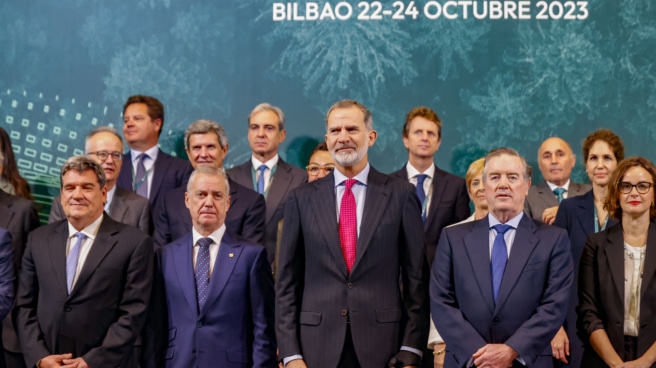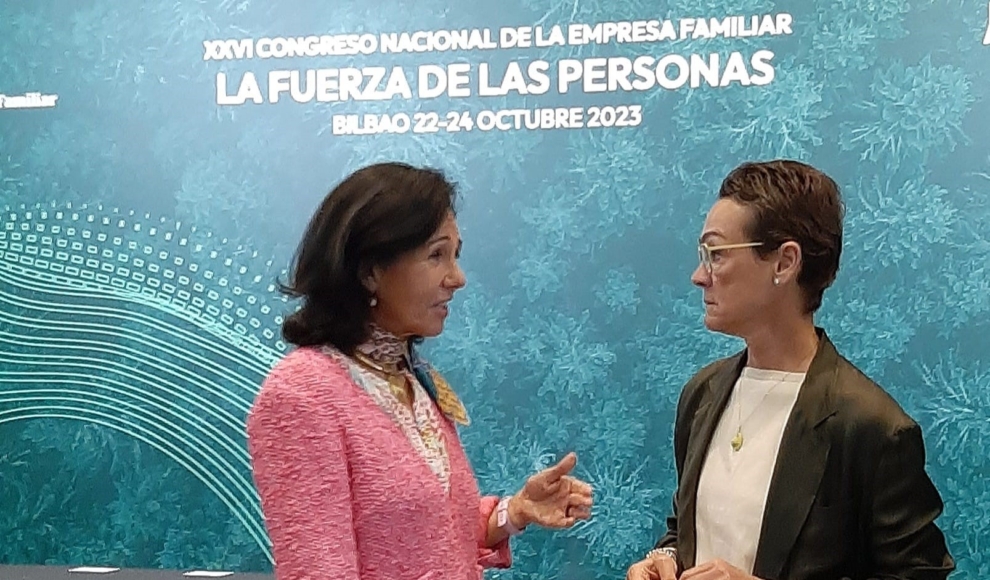

King Philip VI poses with authorities and businessmen at the XXVI Family Business Congress.
The family business is worried. They are worried not only about the image that has been projected about them in society, but also about the labor shortage they have to work with in an increasingly competitive market. They are concerned about the difficulty of finding and retaining the talent they need, as well as the high financial costs that remain in creating jobs. There are not enough engineers, computer scientists, hotel staff… and the education system is unable to produce the talent the economy needs.
They are not reassured by the complex international context or the “polarization” or institutional deterioration in which they see Spain. The X-ray that Sener and Family Business Institute President Andrés Sendagorta took this morning during the opening ceremony of the XVI National Congress of Family Business also includes a demand for his recognition. Businessmen claim their contribution to Spain’s society and economy and believe that in many cases it is not recognised. For now, Sendagorta acknowledged that the business community must also promote a new communications policy that projects “what we do and how we do it” and thus counters “the efforts of others to say something we are not.” . “
Sendagorta assured that one of the biggest challenges faced by almost a million family businesses in Spain – almost 90% of all companies in our country – is attracting and retaining personal talent, “a task of paramount importance.” At the event, chaired by King Felipe VI, Lehendakari Iñigo Urcullu and Minister José Luis Escriva, Sendagorta assured that the “education system” and the laws that promote its development must be improved: “More time is spent highlighting ideological features than real needs.” “economy.
A thousand jobs a day
In addition to changing the training process, the MEF President added a requirement to change the tax regime when creating private jobs. In this sense, he appealed to fiscal policy that would bring real net wages closer to the gross wages that companies pay them, and thus make them more attractive. “Employment should be encouraged, not taxed,” he assured. .
Finally, he called for avoiding polarization in Spain and opting for dialogue and institutional strengthening, as well as a constitutional framework that creates a climate conducive to economic growth and business stability.
King defended the value of a family business, “which is always part of the solution” in situations of uncertainty: “Effort, leadership and a sense of responsibility are necessary in finding and achieving goals.” He defended the family business’s “way of doing things,” an “understanding of business” based on the family’s own values, “an intangible asset that helps group people around projects with a common goal: to improve performance.”

For his part, the Minister of Inclusion, Social Protection and Migration highlighted the great contribution of family businesses over the past three years, which have created 900,000 jobs: “A thousand jobs a day is something commendable.” He recalled that this is also a kind of high-quality employment with higher wages and the result of greater export potential, as well as lower debt levels.
14% of GDP and 1.1 million jobs
The Family Business Congress has become the most important business forum in Spain. The motto chosen this year is “The Power of the People.” Family businesses provide 70% of employment and 60% of Spain’s GDP. According to the Institute of Family Business (IEF), their companies, in addition to representing an important muscle of the Spanish economy, represent the majority of long-lived companies, with a much longer lifespan than non-family businesses. Some of the IEF partners are companies with a century-old history that have been contributing to the prosperity of our country for centuries.
Lehendakari Iñigo Urcullu, Minister of Inclusion, Social Welfare and Migration José Luis Escriva and IEF President Andres Sendagorta were present at the opening ceremony along with the king. During the first day there will be numerous presentations, including presentations by the presidents of the four companies that are part of the Family Business Institute: Tomás Pascual, Corporación Empresarial Pascual, Mane Calvo of GRUPO CALVO and José Manuel Entrecanales, President of Axion. The event was also attended by prominent businessmen such as Mercadona President Juan Roig and Banco Santander President Ana Patricia Botín.
The companies that are part of the MEF employ 1.1 million people. Their combined annual turnover represents 14% of Spain’s GDP, a percentage higher than 24% if the associated territorial family business associations, which cover a further 1,500 companies, are included. All IEF members are presidents, CEOs or board members of the companies they own. Over the 30 years of its existence, the Institute has established itself as a supporting interlocutor with the Administration, protecting the interests of family businesses, identifying best practices in corporate governance and management, as well as providing training and net next generations.
Source: El Independiente